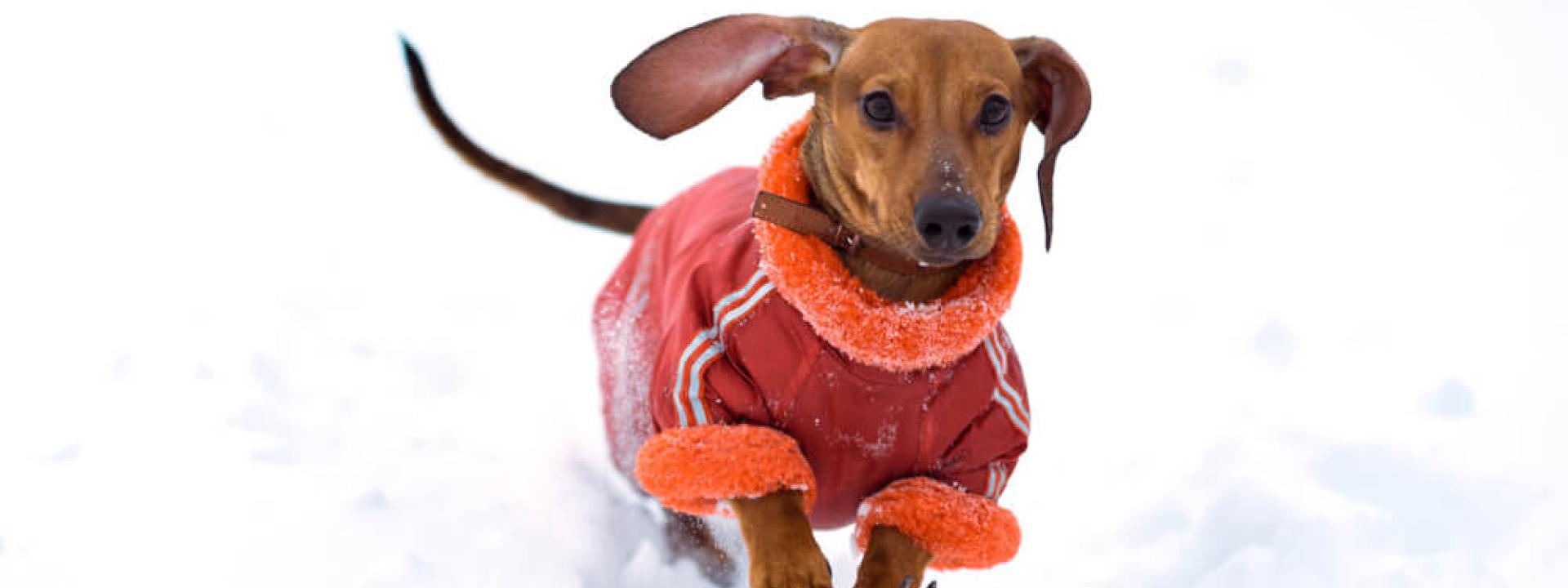
Caring for pets during an Ohio winter requires constant vigilance to stay up to date on weather changes and ensure your pet is prepared. Pet owners may need to adapt their usual routines to consider potential health and safety hazards. Our team at Tennessee Avenue Animal Hospital has put together this comprehensive guide to ensure your pet stays safe, healthy, and comfortable during the winter months.
Update your pet’s grooming routine for the winter
Properly caring for your pet’s coat will help it stay healthy through the winter months so it can keep your pet warm. Follow these do’s and don’ts to ensure your pet’s coat is ready for the cold months ahead:
- DO regularly brush your pet’s coat to prevent matting.
- DO trim your pet’s coat for easier cleaning and to prevent matting.
- DON’T shave your pet’s coat, because it provides natural insulation to protect them from cold temperatures.
- DO dress your pet in a coat or sweater before they head outside. First, ensure your pet is comfortable wearing clothes. If you notice any signs of discomfort, such as panting, pacing, biting, or trying to take the clothes off, don’t force your pet to bundle up.
- DON’T over-bathe your pet. Washing your pet too often in colder weather is likely to strip their skin of natural oils, making it dry and itchy.
- DO use conditioner to replenish moisture in your pet’s skin.
- DO ensure your pet is fully dry before they go outside.
Care for your pet’s paws
In addition to cold temperatures, your pet’s paws are exposed to melting ice, rock salt, and other chemicals used on sidewalks and roads during the winter. This can lead to dry, cracked, or irritated paw pads, which may cause your pet discomfort. Follow these guidelines to keep your pet’s paws healthy:
- Check your pet’s paws after every walk. Clean off any ice or rocks stuck between their toes and look for irritation from exposure to chemicals or cold weather conditions.
- Wash and dry your pet’s paws if they come in contact with harmful irritants.
- Apply a pet-safe moisturizing balm to your pet’s paws if they seem dry or cracked.
- Consider having your dog wear boots to protect their paws. Introduce the boots slowly and give your dog a chance to get used to how they feel on their feet. Don’t forget to reward them with treats and praise for trying something new!
- Keep your pet’s nails trimmed to help prevent any slips or falls on slick surfaces.
Continue winter-safe exercise
During the coldest part of the winter, you may need to limit the amount of time your pet spends outdoors. When you do venture out, ensure you take the necessary precautions:
- Plan your walks during the warmest part of the day.
- Always start with a warm-up. Whether you get your pet moving indoors or begin with a slower walk before increasing the pace, ensure your pet’s (and your own) muscles are warmed up to avoid sprains and strains.
- Keep track of the time. Limit your walks to ten minutes on colder days to avoid over-exposure.
On days that you are stuck indoors, you’ll need to find ways to stay active, such as:
- Playing fetch (if you have the space) or hide and seek with your pet to keep them moving
- Investing in treat puzzles or toys to exercise your pet’s brain
Keep your pet cozy

Thinking ahead and adjusting accordingly will help keep your pet comfortable despite the weather. Stock up on pet supplies, such as litter, food, and medications, before the coldest weather hits. That way you’ll have all your pet’s necessities in case you are stuck inside for a few days.
Your pet will appreciate a cozy, supportive bed to snuggle up in. Set up the bed away from drafts and windows, and add extra blankets if they like to burrow under the covers.
Create a safe environment
Winter brings many unique safety hazards, so remain vigilant to keep your pet safe. Store any toxic chemicals used during the winter, such as deicers and antifreeze, away from pets. Look for pet-friendly products, but if you do have unsafe chemicals such as ethylene glycol-based antifreeze in your home, store it out of your pet’s reach and clean up any accidental spills immediately.
Recognize signs of a weather-related problem
Cold weather can cause a variety of health conditions. Contact our Tennessee Avenue Animal Hospital team or the nearest emergency hospital immediately if you notice any of the following signs:
- Excessive shaking or shivering
- Extreme lethargy
- Vomiting
- Seizures
- Abnormal breathing
Cold weather can be stressful and scary for pet parents, but being prepared can help you have a safe and enjoyable winter with your pet. Give us a call if you have any concerns about your pet during the winter.

